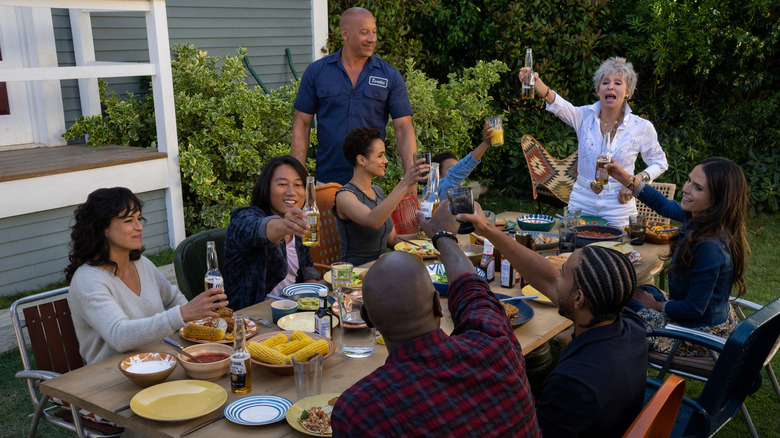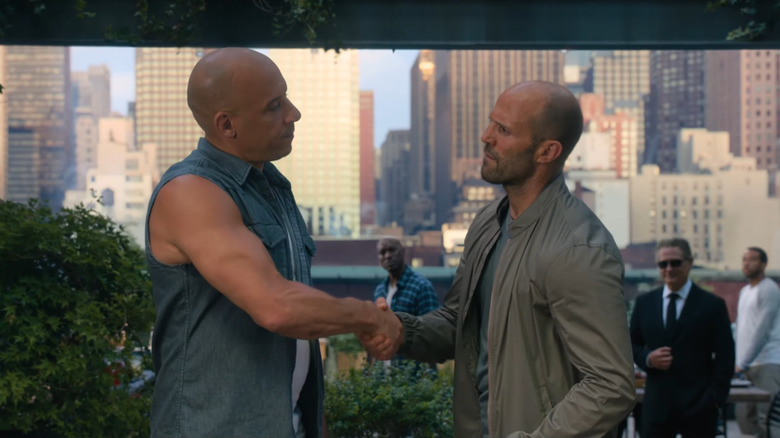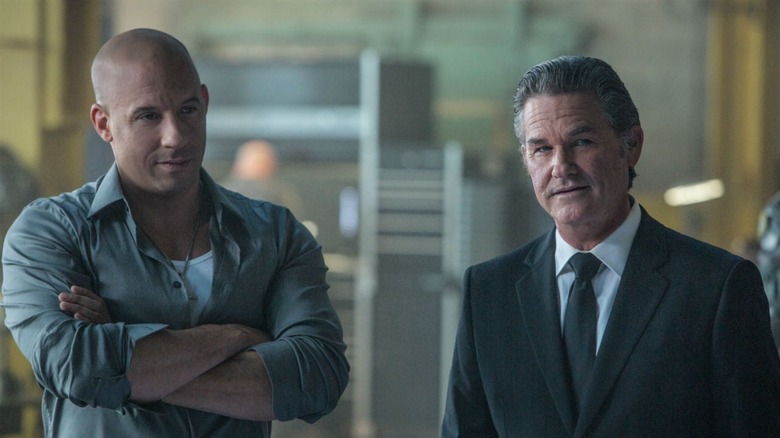Fast X Asks The Big Question: Is The Family A Cult?
This post contains spoilers for "Fast X."
The "Fast and Furious" franchise is many things: A ridiculous blockbuster franchise with spectacular stunts, a big-budget soap opera where death has no meaning and anyone can be resurrected, a high-octane adventure in which cars are extensions of the characters' bodies, and more. Above all else, this is a franchise about family – or at least it's become one in recent years.
Every heist movie and every big spy franchise has a crew, a team that grows closer together as the story goes along. But none hold a candle to Dom Toretto and his crew. This is a team that has gone through hell and back. They have lost members only to see them return from the dead, and have become international terrorists, bank robbers, super spies, borderline superheroes, and even astronauts.
Throughout the ten films (and counting) in the main saga, we have seen the family grow larger and larger, adding special agents, cops, and supervillains to the family barbecue that finishes most movies.
"Fast X," the beginning of the end of the road, does many things differently. It commits the sin of separating the family, it introduces a comic book villain that doesn't match Dom's grunts but rather outshines him in fashion and flamboyance, and it is also the first movie in the franchise to truly interrogate Dom and the crew, asking the big question: Is the family a cult?
I don't have friends, I got family
In "Fast X," we are introduced to a new potential rival-turned-ally, "Reacher" star Alan Ritchson, who brings his ginormous Reacher hands to the franchise as the not-so-shocking, super-obvious villain Aimes. He is the new leader of The Agency in Mr. Nobody's mysterious absence. When we are introduced to Aimes, he is ordering The Agency to hunt down Dom and the family, who are being framed for the opening attack in Rome.
Aimes finally says the quiet part out loud and wonders why The Agency, a super secret, super spy organization, relied so much on a gang of street racers for world-saving missions. What's more, he points out how Dom Toretto leads not really a crew, let alone a family, but what looks more like a cult. Granted, he is the villain, so of course he is overreacting and speaking foolishly. Or is he?
Think about it. We knew even from the very first film that Dom had a way of bringing everyone to his side, with Mia saying he is "like gravity: everything just got pulled to him." As Aimes points out, Dom turned Brian, the cop who was going to arrest him, into his brother-in-law and best friend. Dom also turned Hobbs, another cop who was obsessed with bringing him down, into an ally. Dom even made Deckard Shaw, the man who killed Han (except he didn't), a friend and invited him to the barbecue. Even Cipher, who killed the mother of Dom's child, eventually turned to Dom and the family for help in a time of need.
Family feud
So, is Aimes right? Well, he is not not right. Dom and the family do have some cult-like traits, and their ability to turn every foe into a new member of the family with, as Aimes says, only a Corona and a barbecue is simply extraordinary.
And that is a problem. At some point, villains stop being believable threats if we know they are eventually going to turn into friends. The way Cipher and Letty seem to be on the same team at the end of "Fast X" sure seems to indicate that she will become a friend by the next movie, despite the fact that she literally killed little Brian's mother. It's the same issue with bringing back Gisele, arguably the worst thing the film does, because now death has no meaning and therefore the stakes can never really be real. Did Jakob really die? Did Ramsey and the others? Who knows! But at this point, does it matter?


